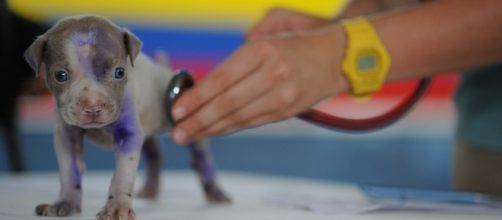As if Dog owners didn’t have enough to worry about with fleas, ticks, allergies and pet food recalls, the latest to be reported on by Fox 32 Chicago, is a deadly infectious bacteria called Leptospirosis. This infection comes from rat urine and is absorbed through a dog’s skin. The warmer temperatures only add to the problem, causing the bacteria to grow rapidly. Places that have a heavy rat infestation are perfect breeding grounds for the bacteria.
Chicago known as “rattiest city” is infected
Dr. Natalie Marks, of Blum Animal Hospital, told Fox 32 that Chicago, Illinois has seen a lot of cases of this bacteria in dogs lately and she attributes it to the city being known for having a lot of rats dwelling amongst the streets and sewers.
She states that it is sprouting up all over the country due to unseasonable warm, wet weather. She calls it “the perfect breeding ground.”
Residents in towns known for a heavy rat population are worried about taking their dogs to dog parks where rats might have been running at night and leaving infected urine for their dogs to walk in. People are also warned not to let their dogs drink from any communal water bowls that might be affected and to be careful when walking their dogs through alleyways and water puddles. Most dog owners don’t allow their pets to drink from water puddles or creeks and rivers, but you just never know when Fido will surprise you if he is thirsty.
How to tell if your dog has the bacteria in their system
Leptospirosis is absorbed through the dog’s skin and gets into the bloodstream and internal organs. It mimics a lot of other things that could be wrong with the dog. The dog might have vomiting, lack of appetite, shivering, weakness and a host of other symptoms. The only sure way to tell if the dog has contracted the Deadly Bacteria is through a test administered by a vet.
Some dogs with mild cases never see a vet and get over the infection, but they can then be carriers and can spread the infection in their own urine. Dogs with serious infections need to be treated with antibiotics and monitored closely. Good hygiene is a must also as this bacterial infection can be spread to humans and produce flu like symptoms.
If you live, visit or walk your dog in a place known to have a heavy rat population take precautions around anything that looks like a “rat bathroom” and steer the dog away. If your dog shows any concerning symptoms, consult a vet and make them aware that the dog may have been in contact with Leptospirosis contamination.

